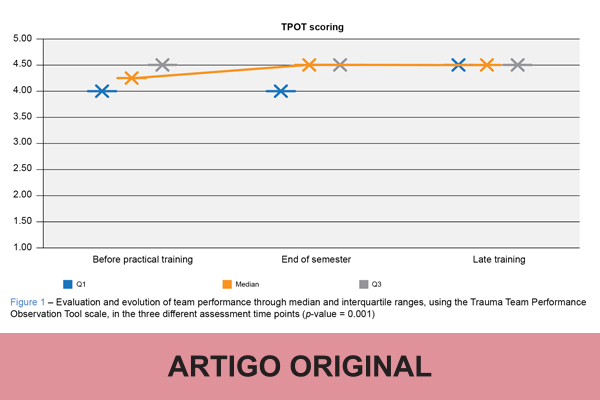SOCIAL MEDIA
Portuguese Medical Association's Scientific Journal

Introduction: Recently, simulation as an educational method has gained increasing importance in Medicine. However, medical education has favored the acquisition of individual knowledge and skills, while overlooking the development of teamwork skills. Since most errors in clinical practice are due to human factors, i.e., non-technical skills, the aim of this study was to assess the impact that training in a simulation environment has on teamwork in an undergraduate setting.
Material and Methods: This study took place in a simulation center, with a study population of 23 participants, fifth year undergraduate students, randomly divided into teams of four elements. Twenty simulated scenarios of teamwork in the initial assessment and resuscitation of critically ill trauma patients were recorded. Video recordings were made at three distinct learning moments (before training, end of the semester, and six months after the last training), and a blinded evaluation was performed by two independent observers, who applied the Trauma Team Performance Observation Tool (TPOT). Additionally, the Team STEPPS Teamwork Attitudes Questionnaire (T-TAQ) was applied to the study population before and after the training to assess any change in individual attitudes towards non-technical skills. A 5% (or 0.05) significance level was considered for statistical analysis.
Results: With a moderate level of inter-observer agreement (Kappa = 0.52, p = 0.002), there was a statistically significant improvement in the team's overall approach, evidenced by the TPOT scores (median of 4.23, 4.35 and 4.50, in the three time-points assessed, respectively, p = 0.003). In the T-TAQ, there was an improvement in non-technical skills, that was statistically significant for "Mutual Support” (median from 2.50 to 3.00, p = 0.010).
Conclusion: In this study, incorporating non-technical skills education and training in undergraduate medical education was associated with sustained improvement in team performance in the approach to the simulated trauma patient. Consideration should be given to introducing non-technical skills training and teamwork in the emergency setting during undergraduate training.